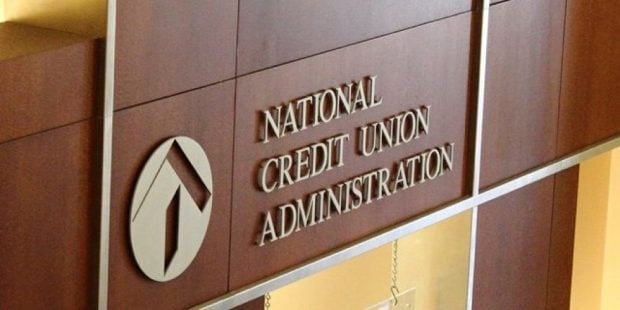 Lobby of the NCUA.
Lobby of the NCUA.
The NCUA board will not issue its regularly scheduled update of the agency's equity ratio this month — an update that could have required the board to take action to shore up the ratio, Chairman Todd Harper said Thursday.
That action could have included charging credit unions a premium.
Recommended For You
Speaking at the board's monthly meeting, Harper said the NCUA will continue to analyze the equity ratio and will review the first quarter Call Reports of federally-insured credit unions, which will be submitted in the coming days.
The board has set the equity ratio's Normal Operating level at 1.38%. However, largely because of a huge influx of money from pandemic-related assistance, including Economic Impact Payments, the equity ratio stood at 1.26% in February.
Federal law requires the NCUA board to develop a restoration plan if the equity ratio falls below 1.20%.
"The pandemic's impact on the economy and the government's related fiscal response has increased uncertainty related to key drivers of the equity ratio, especially insured share growth," Harper said.
Board Vice Chairman Kyle Hauptman said he realizes that credit union officials are worried about being charged a premium.
"I realize the specter of an insurance premium is weighing heavily on the minds of most credit unions," he said. "Of course, safety and soundness of the insurance fund is of the utmost importance."
Hauptman said even if the equity ratio dips below 1.20%, the board would not be required to charge a premium.
Hauptman also presented a new issue for the board to consider. He suggested that the NCUA record examination meetings between the agency and credit unions. He said that credit unions are "universally" in favor of such transparency issues and used the analogy of police body cameras. He suggested that the NCUA consider taking a survey of credit unions to determine their positions on the issue.
"I know that the police and others actually encourage these body cameras," Hauptman said. "Good cops always want these. It provides transparency."
No other board member addressed the issue.
At Thursday's meeting the board also received a briefing on an interim final rule that the board adopted to help credit unions that could face enforcement of prompt corrective action regulations as a result of the influx of coronavirus-related deposits.
The rule in large part mirrors one that the NCUA board adopted last year, as credit unions faced an influx of deposits caused by members' receiving Economic Impact Payments. The rule expired at the end of last year.
The interim final rule temporarily reduces the earnings retention requirement for federally-insured credit unions that are adequately capitalized. Those credit unions unable to meet the earnings retention requirement will not have to submit a written application requesting approval to decrease their earnings retention amount.
However, if a credit union poses an undue risk to the Share Insurance Fund or exhibits safety and soundness concerns, an NCUA regional director may require the credit union to submit that request.
The second part of the rule temporarily permits an undercapitalized credit union to submit a streamlined net worth restoration plan if it becomes undercapitalized largely because of share growth.
"As a result of this change, eligible credit unions will be able to focus their limited resources on serving their members' needs — especially those of modest means and those disproportionately affected by the pandemic — instead of planning for earnings transfers and developing detailed net worth restoration plans," Harper said.
Hauptman said nearly all of the growth in credit union shares is in highly liquid, short-term investments that represent little or no risk of loss.
"Not providing net worth flexibility would have resulted in greater statutory and regulatory pressure to increase yields on loans and investments to increase retained earnings and meet regulatory requirements," he said. "Pressure to reverse net worth ratio trends by reaching for yield during this unprecedented period could in fact be counterproductive."
Board member Rodney Hood suggested that the board consider decreasing the agency's Normal Operating Level to 1.30% — a figure that credit union trade groups have endorsed.
He also endorsed the interim final rule. "Today's rule temporarily streamlines our regulatory requirements for prompt corrective action without introducing undue risk."
The board also received a cybersecurity update.
© Touchpoint Markets, All Rights Reserved. Request academic re-use from www.copyright.com. All other uses, submit a request to [email protected]. For more inforrmation visit Asset & Logo Licensing.






